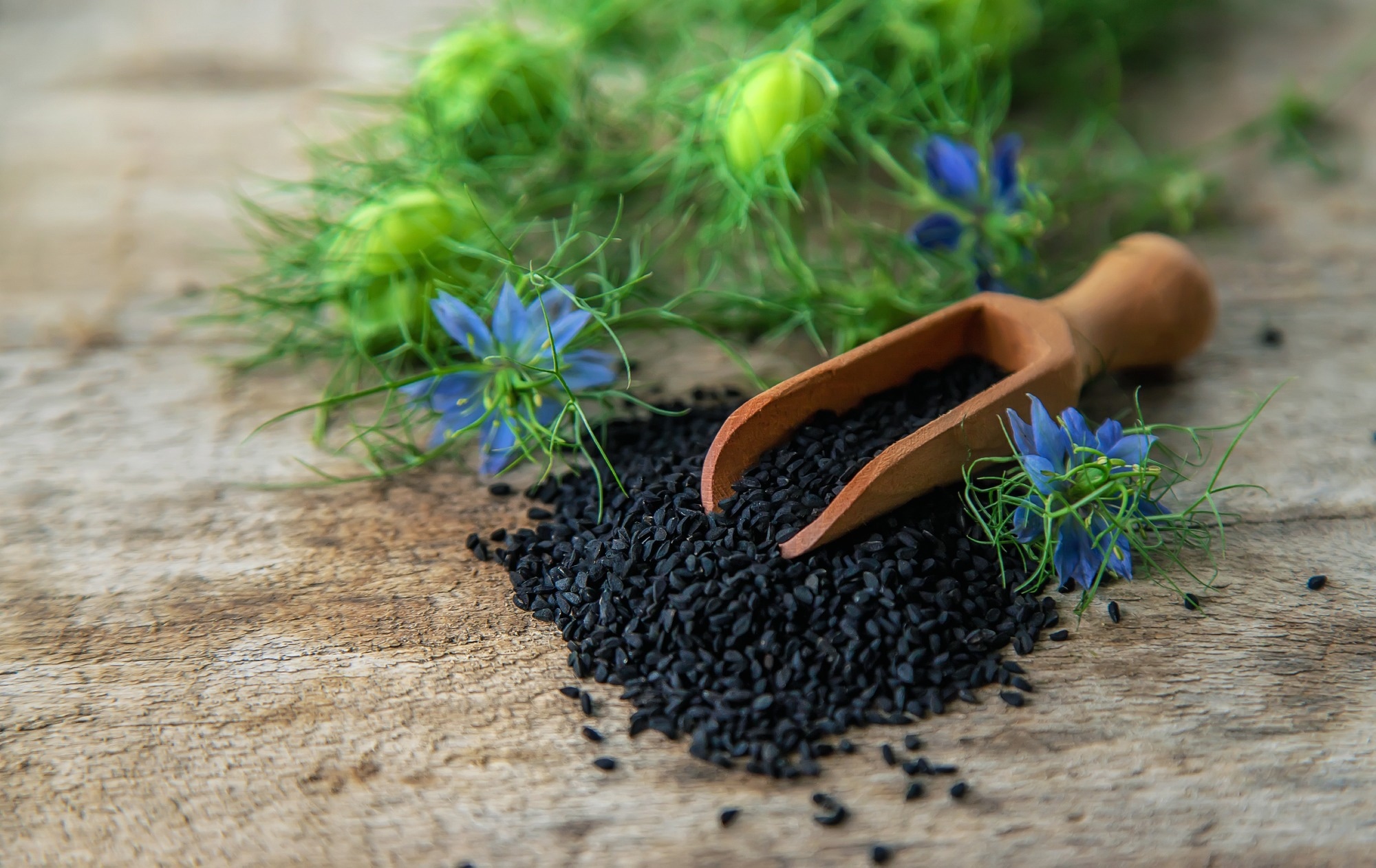A new review highlights how the bioactive compounds in black cumin seeds target multiple inflammatory, metabolic and oxidative pathways, offering early promise for developing safer and more effective treatments for complex chronic diseases.

Review: Potential of Secondary Metabolite Compounds of Black Cumin Seeds (Nigella sativa L.) as Therapeutic Agents for Chronic Diseases. Image Credit: Tatevosian Yana / Shutterstock
In a recent review published in the journal Drug Design, Development and Therapy, researchers discussed the therapeutic potential of black cumin seeds, focusing on how their bioactive compounds, oils, and extracts can help manage chronic diseases.
They concluded that black cumin has disease-modulating, antimicrobial, anti-inflammatory, and antioxidant properties, suggesting it has potential as a natural therapeutic agent. These compounds offer a valuable foundation for developing future treatments for chronic diseases.
Traditional Uses and Bioactive Constituents of Black Cumin
Black cumin has long been valued across Asia, the Middle East, Africa, and the Mediterranean for both culinary and medicinal purposes. Its small black seeds contribute a distinctive flavor while also serving as an important component of traditional healing systems.
Historically, they have been used to manage digestive issues, respiratory conditions, and various skin disorders. Modern scientific interest has grown as researchers have identified multiple bioactive constituents, including thymoquinone, flavonoids, triterpenoids, alkaloids, and essential oils, that exhibit antioxidant, anti-inflammatory, and antimicrobial properties.
Emerging Applications for Chronic Disease Management
Given the rising global burden of chronic diseases such as diabetes, cancer, and immune-related disorders, black cumin has attracted attention as a potential source of safer, less resistance-prone therapeutic compounds.
Its anti-inflammatory effects, largely driven by thymoquinone, exhibit broad mechanistic activity, though current evidence primarily comes from preclinical studies rather than direct comparisons with established pharmacological agents.
Metabolic and Oxidative Benefits Relevant to Diabetes and Metabolic Syndrome
Black cumin also addresses several metabolic and oxidative pathways relevant to current metabolic therapies. Standard treatments for type 2 diabetes and metabolic syndrome primarily target blood glucose, often overlooking oxidative stress and lipid abnormalities.
In contrast, black cumin has been shown to improve fasting glucose, insulin sensitivity, oxidative stress markers, and lipid profiles, making it a useful complementary strategy in research settings when drug therapy alone is insufficient.
Immunomodulatory Actions and Potential in Mild Infections
Its immunomodulatory effects offer another advantage. While many immune-modifying drugs are too strong for mild, chronic inflammation and supplements like zinc provide only broad support, black cumin demonstrates dose-dependent immune effects in preclinical and limited clinical studies, suggesting potential value in modulating protective and excessive immune responses.
Black cumin may also serve as a supportive option for managing mild infections and allergic-type symptoms. Conventional antibiotics and antihistamines can lead to resistance, drowsiness, or gastrointestinal issues, whereas black cumin exhibits antibacterial, antifungal, and mast cell-stabilizing activity, making it suitable for longer-term or preventive use in early-stage research.
Gastrointestinal Protection Supported by Preclinical Evidence
For gastrointestinal disorders, the evidence is limited to studies demonstrating gastric mucosal protection, indicating potential benefit specifically in models of gastric irritation. The paper does not provide evidence for broader gastrointestinal indications, but its antioxidant, anti-inflammatory, and mild antimicrobial actions may help restore gut balance, as supported by preclinical evidence.
Because chronic diseases involve interconnected inflammatory, metabolic, and oxidative pathways that single-target drugs may not fully address, black cumin’s multi-pathway activity offers a broader therapeutic profile.
Antimicrobial, Antioxidant, and Anticancer Bioactivity
Research demonstrates that black cumin extracts and oils inhibit a wide range of bacteria and fungi, including Staphylococcus aureus, Escherichia coli, and Candida species. In neonatal infections, black cumin extract performed comparably to mupirocin. Essential oils exhibit strong bactericidal effects in animal studies, and seed-oil-infused nanocomposite films demonstrate broad-spectrum antimicrobial activity with potential biomedical and packaging applications.
Strong antioxidant activity has been demonstrated across multiple assays, including seed oils, non-volatile fractions, and even silver nanoparticles synthesized from the plant, which show substantial free-radical-scavenging effects. Animal studies report reductions in oxidative stress markers and increases in antioxidant enzyme activity, alongside suppression of inflammatory cytokines.
Black cumin additionally exhibits anticancer properties. Seed oils and thymoquinone show cytotoxic effects against breast, gastric, pancreatic, and glioma cancer cell lines. Thymoquinone can induce apoptosis, arrest the cell cycle, and modulate cancer-related inflammatory pathways, suggesting both direct tumor-suppressive effects and broader anti-inflammatory benefits.
Antidiabetic and Antiviral Potential Supported by Preclinical and Early Clinical Studies
In diabetic models, black cumin extracts improve glucose regulation, lipid markers, oxidative stress, and inflammation. Human studies in patients with diabetic hemodialysis have shown improvements in glycemic control and oxidative status with seed-oil supplementation. Evidence also suggests enhanced insulin secretion and potential synergy with antidiabetic medications.
Antiviral effects have also been observed. Seed extracts and oils show activity against hepatitis viruses and severe acute respiratory syndrome coronavirus 2 (SARS-CoV-2). In mild COVID-19 cases, black cumin oil improved recovery rates and shortened illness duration. Lipophilic fractions strongly inhibited hepatitis C RNA helicase activity, indicating potential applications in targeted antiviral therapy.
Broad Therapeutic Promise With Need for Further Clinical Validation
Black cumin contains multiple compounds with broad therapeutic potential for the treatment of chronic diseases. Its antioxidant, anti-inflammatory, antimicrobial, anticancer, and antidiabetic activities operate through diverse mechanisms, including enzyme inhibition, cytokine modulation, cytotoxic action, and viral suppression.
Structure-Activity Relationship (SAR) studies further support its potential as a source for future drug development. While more clinical research is needed, black cumin remains a promising natural resource for developing safer and more effective treatments for complex, multifactorial conditions.
Journal reference:
- Kurnia, D., Dharsano, H.D.A., Takaya, A., Padilah, R., Apriyanti, E. (2025). Potential of Secondary Metabolite Compounds of Black Cumin Seeds (Nigella sativa L.) as Therapeutic Agents for Chronic Diseases. Drug Design, Development and Therapy 19: 9603-9626. DOI: 10.2147/DDDT.S554704, https://www.dovepress.com/potential-of-secondary-metabolite-compounds-of-black-cumin-seeds-nigel-peer-reviewed-fulltext-article-DDDT